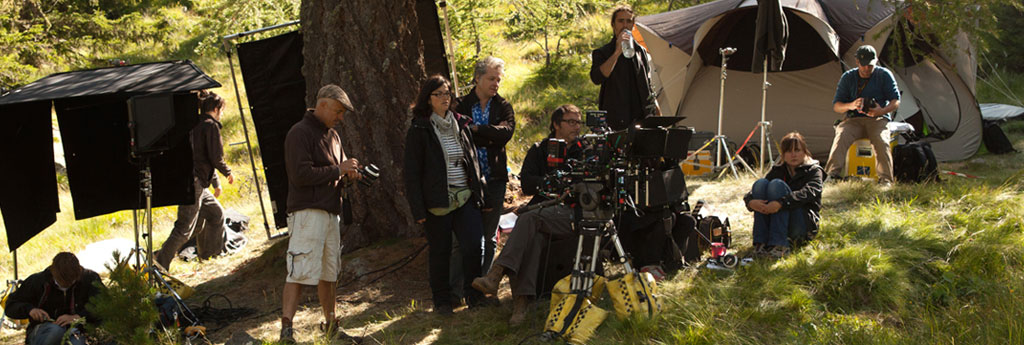
At the panel discussion Drivers of Sustainability in Europe at the Cannes film festival, international industry experts gave an insight in their green strategies. While the environment is part of the constitution in Italy, in Germany productions need to incorporate ecological standards. In France the green regulations start with the use of a carbon calculator and Mallorca is rolling out a Green Film Shooting plan. The event was hosted by the Sardegna Film Commission and Green Film Shooting in collaboration with Cinecittà and the Italian Film Commisssions.
In Germany ecological production standards are becoming mandatory for film productions starting on July 1. „All the funding systems will start with the same ecological production standards. It is a huge success that these are the ecological standards for the whole industry“, says Peter Dinges, Chairman of the German Federal Film Board (FFA). „The broadcasters and streamers committed themselves and signed. They will apply the ecological standards not only for funded productions but also for their commissioned productions.“ The ecological production standards have been tested by productions in a practical lab and include 39 requirements, among them 21 requirements which are mandatory. „When a producer applies this requirements he has five jokers“, Peter Dinges points out. „This is only in the beginning. In a year, it will become more strict.“
In France, the Centre national du cinéma et de l’image animée (CNC) launched a national plan for green action. The French film fund requests from the producers to do a carbon calculation and deliver this report to them. „The CNC wants to measure the impact of the film industry on the environment and collect data“, says Joanna Gallardo, Head of Production Forum at the Film Paris Region and Adviser of Ecoprod. Since 2009, Ecoprod has been promoting green film measures, and it has been working to encourage the film and TV industry to consider environmental issues. The association provides training for film professionals and recently launched a label for green film production „In 2023 we will test it if it is tangible.“
 In Italy, green film production was started by the Sardegna Film Commission that introduced a program on green film production and green storytelling in 2014. Besides introducing eco-friendly practices to the industry and developing a green protocol for live-action films, the Sardegna Film Commission is also a driving force of green animation. „We started a public lab for training and production in a former tobacco factory where we are testing the entire scope of productions“, says Nevina Satta, CEO, Sardegna Film Commission and General Secretary of the European Film Commission Network (EUFCN). „We have to deal with international productions and different protocols“, emphasizes Nevina Satta, who is also the Co-chair of Governors at the UN initiative ENZA, that is working on a common sustainability strategy for the entertainment industry. „We have to share our data and information so that we can track a progress on a global level.“
In Italy, green film production was started by the Sardegna Film Commission that introduced a program on green film production and green storytelling in 2014. Besides introducing eco-friendly practices to the industry and developing a green protocol for live-action films, the Sardegna Film Commission is also a driving force of green animation. „We started a public lab for training and production in a former tobacco factory where we are testing the entire scope of productions“, says Nevina Satta, CEO, Sardegna Film Commission and General Secretary of the European Film Commission Network (EUFCN). „We have to deal with international productions and different protocols“, emphasizes Nevina Satta, who is also the Co-chair of Governors at the UN initiative ENZA, that is working on a common sustainability strategy for the entertainment industry. „We have to share our data and information so that we can track a progress on a global level.“
In Spain, the Mallorca Film Commission started to introduce green film production practices to the producers in 2017. „It was a slow proccess because they were always discussing the costs of green measures“, says Pedro Barbadillo, CEO of the Mallorca Film Commission. „Therefore we decided to go the opposite way. Instead of pushing them to become more greener, we support the industry in a structual way.“ The regional film fund set up a Green Film Shooting plan which was approved with € 2,1 m. „This allows us to launch calls for all the action lines that are necessary to go green.“ Furthermore, the Mallorca Film Commission is launching training courses for green PAs, production managers as well as teachers in film schools.
In order to reduce the environmental impact of the co-production projects, Eurimages, the cultural support fund of the Council of Europe, introduced an additional selection criterion for its Co-Production Support Program in January 2023. “The aim is to raise awareness amongst applicants, and to create a leverage effect”, stresses Thierry Hugot, Analyst at Eurimages. The industry experts take this new criterion into consideration as part of their overall evaluation of a project for the co-production funding. “It is not an eligibility criterion. At this stage it is only a declaration by the producers that can be checked at the end of the projects.” The aim was to put this subject matter on the table for the producers as well as the experts in the commissions. “All projects can apply”, emphasizes Thierry Hugot. “It only make a difference if projects are assessed equally.”
The European Film Academy (EFA) is also implementing a sustainaility strategy. „We are adapting to the changing world inside and outside of the academy“, says Graziella Bildesheim, Board Member of the European Film Academy. One of the first steps was to plant trees in Iceland where the 2022 European Film Awards ceremony took place. Measures such as reducing the carbon fooprint by working on sustainable mobility concepts, serving vegetarian meals and using locally-sourced materials are already on the agenda. „We are also working on a new green award that we want to give out.“
© Photos: Diana de la Cuadra













 Robert Redford
Robert Redford Hannes Jaenicke
Hannes Jaenicke Nic Balthazar
Nic Balthazar Nadeshda Brennicke, Actress
Nadeshda Brennicke, Actress Darren Aronofsky, Director, Noah / Jury President, 65th Berlin International Film Festival
Darren Aronofsky, Director, Noah / Jury President, 65th Berlin International Film Festival Tim Bevan
Tim Bevan Thekla Reuten
Thekla Reuten Rachael Joy
Rachael Joy Nikola Rakocevi
Nikola Rakocevi Nadja Schildknecht
Nadja Schildknecht Michael Bully Herbig
Michael Bully Herbig Lars Jessen
Lars Jessen Helen Hunt
Helen Hunt Douglas Trumbull
Douglas Trumbull Dieter Kosslick, Director Berlin International Film Festival
Dieter Kosslick, Director Berlin International Film Festival Benoit Delhomme
Benoit Delhomme Jeremy Irons
Jeremy Irons